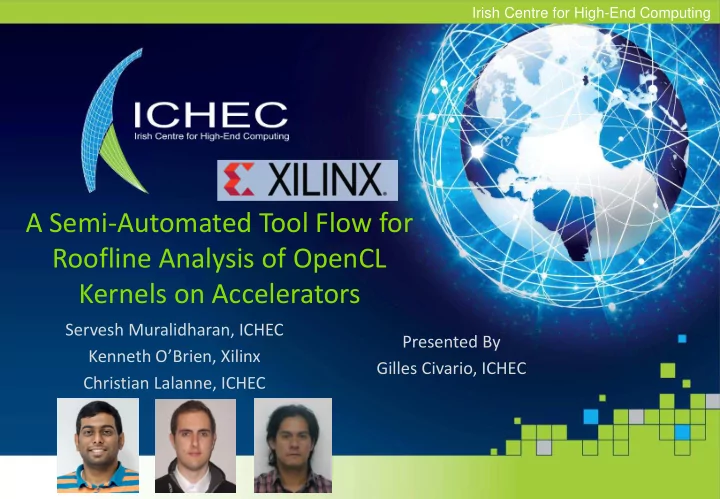

Irish Centre for High-End Computing A Semi-Automated Tool Flow for Roofline Analysis of OpenCL Kernels on Accelerators Servesh Muralidharan, ICHEC Presented By Kenneth O’Brien, Xilinx Gilles Civario, ICHEC Christian Lalanne, ICHEC
Irish Centre for High-End Computing Motivation • Comparing a diverse set of OpenCL supported platforms on a common set of metrics is a non-trivial problem • Optimizations performed on one platform may or may not lead to optimal performance on another • Lack of a tool that compares device capabilities and OpenCL kernel performance
Irish Centre for High-End Computing Semi-Automated Tool Flow Design • Complete automation is difficult to impossible due to the variety of tools and platforms • Staged approach to eliminate redundant steps • Device analysis performed once on each platform • OpenCL kernel analysis repeated for each application version
Irish Centre for High-End Computing OpenCL Accelerators Compared • Measured Peak is better for comparisons but in some cases estimations are necessary • Xeon Phi has the best measured peak integer based performance • Tesla K20 has the best measured peak floating point performance • ADM 7V3 has the lowest peak power consumption and estimated non floating point performance ADM 7V3 ADM 7V3 peak integer performance is estimated using, 70% of (#LUTS/20) *200Mhz(operating frequency of the FPGA), which is 0.7*(433200/20)*200 = 3032.4 OPS/s. Remaining LUTs comprise infrastructure surrounding kernel. )
Irish Centre for High-End Computing Device Rooflines Performance Roofline Performance Per Watt Roofline Represents non floating point performance Represents floating point performance
Irish Centre for High-End Computing Tool Flow • Iterative approach • Analysis feedbacks to optimizations
Irish Centre for High-End Computing Evaluation W = 1224 Million OPS Q = 367 Million bytes I = 3.33 OPS/Byte
Irish Centre for High-End Computing Results – Intel Xeon Phi 5110P • Optimal implementation of the function is memory bound on the Xeon Phi • 66.70×10^9 OPS/second • 0.38×10^9 OPS/second/Watt • Performance limitation due to the inability to use vector processing units of the Phi due to the inherent feedback loop and branch divergence
Irish Centre for High-End Computing Results – Nvidia Tesla K20 • Optimal implementation of the function is not as badly memory bound in comparison to Xeon Phi • 126.42×10^9 OPS/second • 1.18×10^9 OPS/second/Watt • Possible performance limitation due to branch divergence
Irish Centre for High-End Computing Results – Alpha Data ADM-PCIE-7V3 • Optimal implementation is heavily memory bound much worse than the Xeon Phi • 18.11×10^9 OPS/second • 1.02×10^9 OPS/second/Watt • Improvements to memory controller efficiency and number of memory channels on the platform can increase performance
Irish Centre for High-End Computing Conclusion • Semi-automated tool that can benchmark, measure and evaluate implementations of an algorithm across different OpenCL accelerators. • Performance per Watt extension to roofline models presents insight into the peak energy efficiency • Methodology to present experimental results on otherwise theoretical roofline models • Currently investigating a diverse range of OpenCL applications that reflect a wide range of operational intensities.
Recommend
More recommend